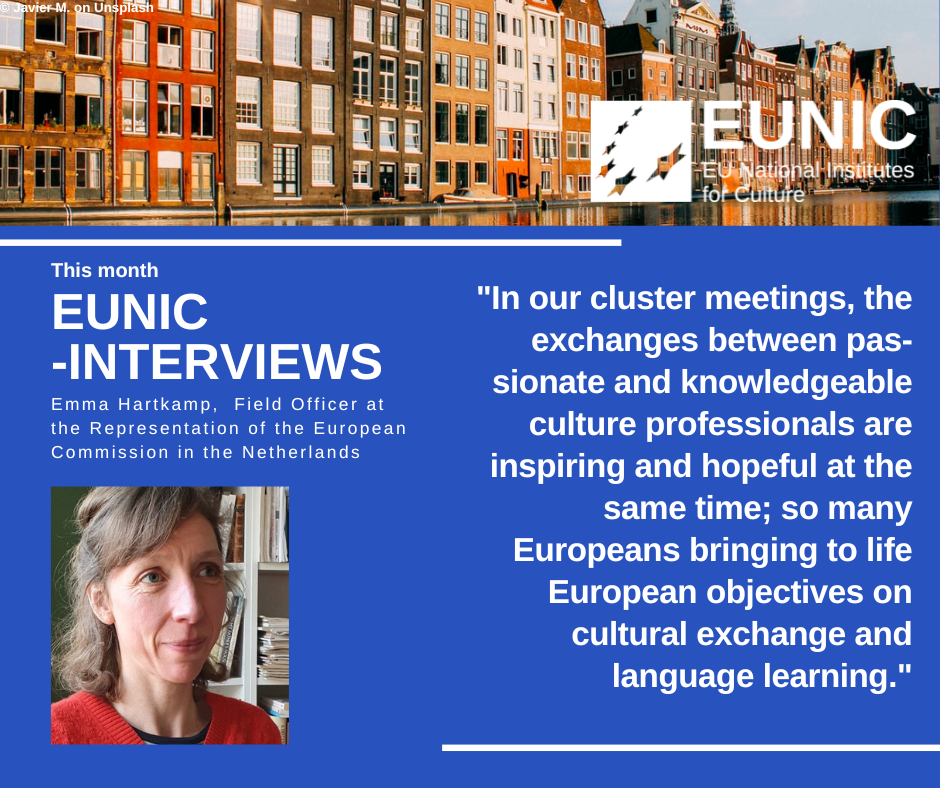This month, we would like you to introduce you to a very special member of our cluster: Emma Hartkamp, who works for the Representation of the European Commission in the Netherlands. You may have heard about her already if you were following the series on multilingualism EUNIC organised last year or joined for the European Day of Languages. But why is the European Commission a member of EUNIC Netherlands? And what projects will Emma be involved in this year?
Read her interview below.

1) What role do you play in your institute/embassy?
The official title of my function at the Representation of the European Commission in the Netherlands is ‘field officer’, an ‘obscure’ name for a job in which clear writing for the public takes an important place 😊. On the one hand, I translate, edit and localise Commission texts for the Dutch public, e.g. press releases, opinion articles, web texts and social media slogans. On the other, I organise events in the Netherlands in the field of translation, languages and multilingualism. Indeed, although the EU countries design their own policies in the field of education and culture, the Commission promotes multilingualism and language learning as a corner stone and founding principle of the European Union.
It is a very interesting role, as I always need to keep in mind both ‘worlds’: the objectives and ambitions of the Commission and the Dutch language sector, with its specificities, challenges and particular needs. The objective is to draw the best of two worlds and to let them benefit from each other.
2) How do you contribute to EUNIC?
The European Commission has a particular status within EUNIC NL, as an ‘observer’ and important partner in many projects. Attending the cluster meetings allows the Commission to take stock of important developments and initiatives in the Dutch cultural sector, springing from successful cooperation projects between national institutes of culture and embassies in the Netherlands. EUNIC and the Commission share important objectives, such as intercultural exchanges and multilingualism in Europe, which allows us to cooperate in a great number of projects. For quite a few years already, we have organized together two playful and valuable events for the yearly European Day of Languages, on 26 September: fun language classes in a wide variety of European languages for lower high school pupils and speak-dates for the general public to get a taste of an unknown language or bring back memories in another language. This year, the OBA (public library of Amsterdam) will organize a whole series of speak-dates around our European edition thanks to the success of the last edition!
Last year, we also launched a new cooperation project, which attracted wide and new audiences in the field of translation and languages. In this series of lectures/talks and panel discussions, we organised a lecture with tips and tricks on multilingual education, a passionate and inspiring talk on language learning through films and subtitling (combine business with pleasure!), a discussion on multilingualism in big cities and a panel discussion on multilingual diversity in Europe in theory and practice. This year, the next appointment in this series might address the wide and ever-growing range of language professions.
3) What is the best aspect about being a EUNIC Netherlands’ member?
It is a great pleasure to see the European Union live and thrive ‘in the field’. This is perhaps where the function title ‘field officer’ makes sense after all 😊. In our cluster meetings, the exchanges between passionate and knowledgeable culture professionals are inspiring and hopeful at the same time; so many Europeans bringing to life European objectives on cultural exchange and language learning. I have the privilege to shape common projects with the fantastic members of the Dutch EUNIC cluster and participate in many others, in the interest of Europe and the Netherlands, and to my personal pleasure.


